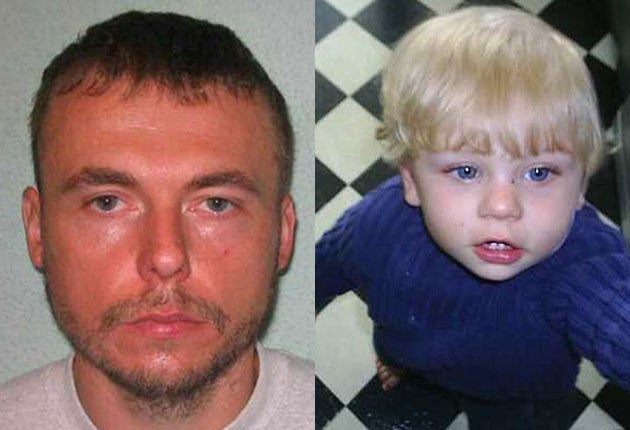Lodger wins appeal over Baby P sentence

One of three people convicted over the death of Baby P could be freed from jail within two years and given a secret new identity after the Court of Appeal yesterday reduced his initial prison sentence.
Jason Owen, 37, was convicted alongside his younger brother Steven Barker and Baby P’s mother Tracey Connelly of causing or allowing the death of Peter Connelly. Owen and his 15-year-old girlfriend were lodgers in the flat in Haringey, north London, where the toddler was found in a blood spattered cot in August 2007 with more than 50 injuries despite being on the child protection register.
Barker, who had a long history of violence towards animals and vulnerable people, tortured the child as his mother and Owen looked on, doing nothing to help Baby Peter escape from the abuse.
In May Owen – who changed his name following Baby Peter’s death – was handed down an indeterminate sentence of three years which could have meant spending a lifetime in jail. But yesterday three judges in the Court of Appeal overturned his sentence and reduced it to six years after his lawyers successfully argued that he no longer posed a risk to the public.
The court’s decision to reduce Owen’s sentence was criticised last night by the NSPCC who also said the Attorney General should have launched an appeal against Owen’s initial sentencing. In June Baroness Scotland declined to look into increasing the sentences, citing the fact that they were indeterminate.
But NSPCC chief executive Andrew Flanagan said last night: "The NSPCC questioned Jason Owen’s original sentence at the time but some argued that its indeterminate nature would result in him being jailed for many years. That the judge felt the need to sentence in this way suggests that he considered the penalties open to him were insufficient. Since the Appeals court has now found the indeterminate sentence to be inappropriate we, and doubtless many others, question whether the punishment fits the crime. We fear it does not.”
Owen has already spent 289 days in prison which will count towards his overall sentence, meaning he could be eligible for parole within two years. And because of the widespread public outrage over Baby P’s death he will almost certainly be given a new identity on release to protect him from vigilante attacks.
The reduction in Owen’s sentence came a day after it emerged that Baby Peter’s 28-year-old mother, Tracey Connelly, had abandoned an appeal against her five year indeterminate sentence. Barker, Connelly’s boyfriend, is currently serving a 12 year sentence for allowing the death of Baby Peter and is also in the middle of an appeal against his conviction for raping a 2-year-old girl.
In court yesterday Owen’s QC Tim Roberts argued that his client’s indeterminate sentence was “wrong in principle” because there was no evidence that suggested he would pose a risk to the public in the future.
Overturning the indeterminate sentence Lord Justice Hughes said: “[Owen’s] present offence is deeply unpleasant because a completely innocent child whom he could have protected was not protected by him against harm by others. He displays a willingness to deceive… which is unattractive. But to translate that into a significant risk that he will himself in the future commit offences involving death or serious personal injury to the public is simply a step too far.”
He added that while Owen may have failed to prevent a toddler from being abused that did not automatically mean he would go on to abuse or be violent in the future.
“Some risk of serious harm is not the test,” he said. “If it were there would be an enormous number of defendants who would need to be in prison indefinitely. The test is the existence of a significant risk - enough to warrant a sentence which may never end.”
Technically the earliest Connelly could become eligible for parole is in three years time although few expect the parole board to free her on her first attempt. She would then be eligible to apply for parole in another two years time although indeterminate sentences allow prison authorities to keep prisoners in jail well beyond their tariff if they are believed to still pose a threat to the public.
With such high profile cases where the perpetrators of a crime have become widespread hate figures the parole board will also have to decide whether to provide new identities or round the clock protection.
